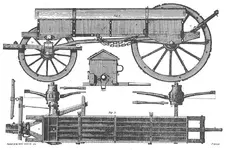bigscoop
Gold Member
- Joined
- Jun 4, 2010
- Messages
- 13,541
- Reaction score
- 9,078
- Golden Thread
- 0
- Location
- Wherever there be treasure!
- Detector(s) used
- Older blue Excal with full mods, Equinox 800.
- Primary Interest:
- All Treasure Hunting
You're looking at thousands of pounds, when in fact it would have only been a few hundred pounds, if they used a few teams of work animals.
I'm thinking it still would have been the same "thousands of pounds" no matter how you divide it all up, which in itself brings about yet another issue, the number of pack animals required, plus the number of personal transportation animals required, etc. Point is simply this, no matter how one wishes to look at it, all of the accumulated real world details cancel out any chance that these grand adventures were anything like the simple adventures that they were narrated to have been. Obviously there would have been "a lot" of pre-planning and prior arrangements involved, this only becoming more evident as the number of required pack animals, wagons, horses, ox, supplies, trade, steamboats, etc., continues to increase in order to make the grand adventures, "more possible." Just saying.....perhaps things were a lot more challenging and time consuming then they might otherwise appear at routine glance.




